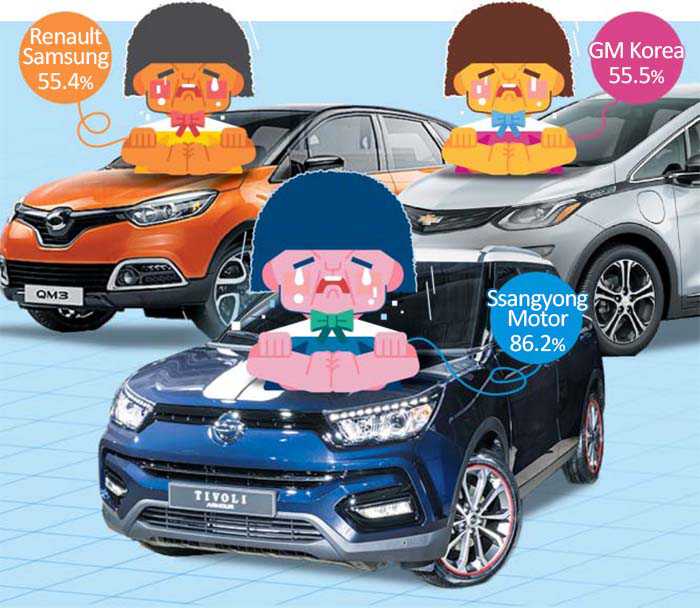Smaller Carmakers' Factories Idle
19 December, 2019

Assembly lines at Korea's three smaller carmakers GM Korea, Renault Samsung and Ssangyong idled for almost half of this year.
The Korea Automobile Manufacturers Association on Wednesday said the average factory operation rate of the three automakers stood at just 59.4 percent from January to November. Their total output capacity was 1.09 million cars, but only 650,000 rolled off their assembly lines, accounting for just 18 percent of total car output in Korea.
The last time their operation rate fell below 60 percent was in 2009, in the aftermath of the global financial crisis, when it plunged to around 52 percent.
Industry analysts say the rate must surpass 75 percent if the companies are to make a profit. That signals more layoffs ahead. GM Korea's operation rate stood at 55.5 percent, Renault Samsung's at 55.4 percent and Ssangyong's at a healthier 86.2 percent.
Already last year, GM shut down an assembly plant in Gunsan and laid off around 3,000 workers, but domestic sales and exports kept plummeting, so the remaining factories got no busier. The carmaker hopes to boost the operation rate of its Bupyeong plant in the first half of next year by producing the new mid-sized Chevrolet Trailblazer SUV, but the Changwon plant will have to run at half-capacity until 2022, when a new cross-over utility vehicle will go into production there.
After accumulating W4 trillion of losses over five years, GM had hoped to break even this year, but decided recently that the target is unattainable (US$1=W1,168). A GM Korea staffer said operations "will normalize once new car production resumes." But some industry watchers are betting that GM will eventually pack up and leave Korea.
Renault Samsung and Ssangyong may end up walking down the same path. Since 2007, Ssangyong achieved a profit only once, in 2016, while suffering losses the rest of the time that added up to W1 trillion.
The SUV maker could not afford to invest in new car development and has no new models lined up next year. "Ssangyong should have shifted its diesel-centered business to hybrid and electric cars but didn’t have the resources," an industry insider said.
Yet Ssangyong has more pressing concerns since it faces W70 billion in maturing bonds. Investments are needed from parent company Mahindra, but that is also suffering losses due to declining car sales in India.
The head of Ssangyong's labor union recently visited Mahindra's headquarters to seek fresh investments but was apparently told by management that the majority shareholder and the Korean government must both offer support.
Last year, state-run Korea Development Bank set an unfortunate precedent by pumping W800 billion into GM Korea, so Mahindra is making the same demand.
Renault Samsung, meanwhile, lost a big outsourcing job -- making the Nissan Rogue compact SUV -- and has nothing else lined up. Renault Nissan headquarters has naturally been reluctant to allocate new jobs after a drawn-out labor strike at the Busan plant earlier this year. It is capable of producing 300,000 cars annually but rolled out only 210,000 last year, dwindling to an estimated 160,000 this year and just 120,000 next year.
A clear deficit is forecast in 2020, but unionized workers are revving up to strike again. Renault Samsung recently started taking applications for voluntary retirement to lay off 400 workers, but fewer than 100 jumped and the rest may have to be pushed.
The global car industry is undergoing a tectonic shift. A supply glut amounts to 25 million conventional vehicles amid the growing popularity of car sharing and eco-friendly cars.
GM, Volkswagen and other global automakers announced plans this year to lay off around 80,000 workers. In Korea, car factories suffer from chronic inefficiency, while militant labor unions and antiquated labor laws make it extremely tough to lay off staff.
Yet the average salary at Korea's five automakers is higher than at Toyota and Volkswagen, so the ratio of labor costs to revenues is also higher.
Source:
TAG(s):
